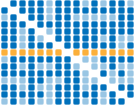The page of Jókai Mór, English biography
Biography
Born February 18, 1825 in Komárom; died May 5, 1904 in Budapest. Novelist, short-story writer, poet, dramatist. Father a lawyer; aristocratic family. Attended Reformed gymnasium in Komárom. In 1835 was sent to school in Pozsony, where he learned German. Resumed studies at home in 1837. Short poem published in Társalkodó in 1834. Began studies at Református Kollégium in Pápa in 1841, where his skills in writing and painting distinguished him and he began friendship with Sándor Petőfi (q.v.). Studied law in Kecskemét 1842-1844. Law apprentice in 1845; passed examination in 1846, but after winning first case, the success of his first novel caused him to abandon law career. Undertook editorship of Életképek in 1847, with Petőfi as best known associate. Became one of leaders in youth activities during March 1848. Married Róza Laborfalvi in summer 1848. Fled to Debrecen with Kossuth government in 1849. After collapse of Revolution he hid for a time in Tardona in Bükk mountains. Returned to Pest in 1850, where he devoted himself to political, editorial, newspaper, and literary activities. Founded Nagy Tükör in 1856, Üstökös in 1858, and A Hon in 1863. Member of Academy in 1858, Kisfaludy-Társaság in 1860. Parliamentary representative in 1861 and 1865-1896 but lessened political and editorial activities in 1880's. Visited Paris twice and Italy several times. Elected first President of Petőfi-Társaság in 1876. Greatly depressed by wife's death in 1886; his care was undertaken for a time by adopted daughter. Married Bella Grosz in 1899. Warmly received by French writers and artists during visit to Paris Exposition in 1900. Continued to write during last years.Most distinguished writer of romantic fiction in Hungary. Established novel as genre in Hungarian literature. So prolific that his works are still not collected into a complete edition. Novels and short stories filled with exotica and fantasy from all ages and parts of world; portray ideal world and express optimistic view to sustain hopes of Hungarians for better life. Power to build legends responsible for romantic views of leading 19th-century figures in Hungary and participants in Revolution of 1848-1849 by which succeeding generations remember them. Does not seek to penetrate character or situation but to weave delightful impressions and to decorate with ever richer colors. Noted for variety and richness of themes, descriptive and structural artistry, and skillful use of language. His short stories are excellent, his poetry, mostly political, inferior; his dramas are of little interest, though numerous.
Many of his novels have been translated into Armenian, Bulgarian, Chinese, Croatian, Czech, Danish, Dutch, English, Esthonian, Finnish, French, German (mainly), Hebrew, Italian, Latvian, Lithuanian, Polish, Rumanian, Russian, Ruthenian, Serbian, Slovakian, Slovenian, Spanish, Swedish, Turkish, and Ukrainian; editions of his short stories are available in Czech, English, Esthonian, Finnish, French, German, Italian, Polish, Serbian, and Swedish.




